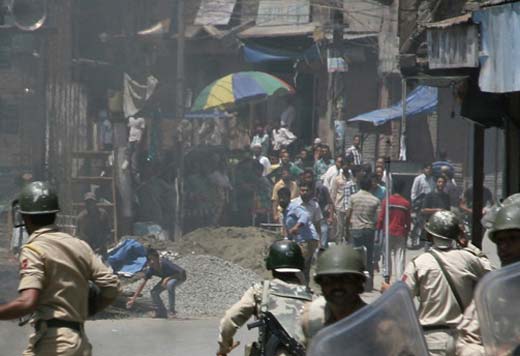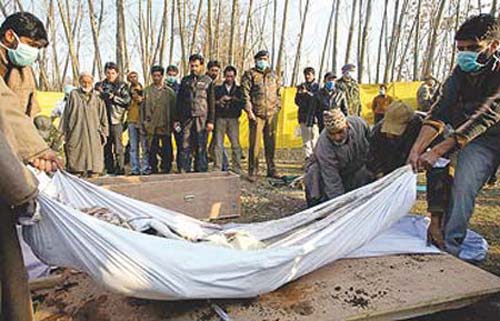Nearly 14 years after people were expecting some sort of justice in the Panchalthan fake encounter but the army dismissed the CBI investigations saying there is no material evidence against its indicted soldiers. Analyzing the turns and twists that the case underwent after two Commissions and multiple police investigations found their bits and pieces, R S Gull asks does this manslaughter needs another probe?

The army taking the Pathribal case to the Court Martial even after the CBI investigated, it baffled the human rights watchdog Amnesty International. But for Christine Mehta, one of its researcher, the outcome was not surprising because “it (army) has given itself a clean chit.”
By December 2013, Army had found 129 personnel guilty in 59 cases of human rights violations in last 20 years as 97 per cent of complaints it had received were “false” aimed at “maligning the image of the Armed Forces.” But Amnesty says that India’s army is “notoriously reluctant to share substantive information about how they conduct inquiries and courts-martial into allegations of human rights violations, and the results of these processes,” the watchdog said. “Claims that an overwhelming majority of complaints are ‘false’ reflect a culture of impunity rather than an absence of wrongdoing,” it added.
Pathribal took place in 2000 summer. The army acted against nobody till the Supreme Court gave it the option of trying its personnel in a court martial if it is not interested in trying the case in a criminal or a civil court. The court was convened at Nagrota. Some of the witnesses that the court summoned were not in a position to depose for health reasons. As a public outcry followed, their statements were recorded at Awantipora. Given the seriousness that the army exhibited in recording the statements, almost everybody was sure that army might offer exemplary punishment to the accused identified already by the CBI.
But the statement that army issued in Jammu disappointed one and all. “The evidence recorded could not establish a prime facie case against any of the accused persons,” army spokesman in Jammu said. “However, it was clearly established that it was a joint operation by the police and the Army based on specific intelligence.”
A new pessimism took over the political elite on either side of the ideological divide. Awami Itehad Party’s Engineer Rashid saw it the statement an illustration of “zero accountability” and not the “zero tolerance” to the violations of human rights. “Army must say why it closed Pathribal case after the premier investigating agency CBI charge-sheeted its five soldiers,” Rashid said. “From Prime Minister to Army Chief, everybody has been bragging about zero tolerance (but) when it comes to violations in Kashmir it meant hundred percent tolerances to gross human rights abuses by the men in uniform.”
In the “miscarriage of justice”, Mufti Sayeed, the former Chief Minister and founder of opposition PDP saw the difficulty in managing restoration of credibility in institutions among the people of J&K. “Army’s decision is a huge setback to the efforts at reconciliation and delivery of justice, which is prerequisite for building trust,” Mufti said. “There are many instances in which standards of justice applied to incidents taking place in J&K which were short of the universal standards applied in rest of the country, Pathribal atrocity stood out even among them for its cruelty and context.”
Pathribal, according to Mufti, could prove a test case for “our institutions” to rise above other considerations and uphold the supreme principles of justice to open a new chapter of reconciliation in Kashmir, but it has clearly been wasted.
A person who is personally aware about the discriminations that the system has been resorting to in Kashmir offered a new comparison. “While there is a genuine outrage at Khirki incident in New Delhi (where AAP raided the Africans), the opposite of it is seen in J&K, where all institutions, from the local police station to the highest court in the land, have for the last 15 years not been able to deliver justice or provoke a national debate, even though five innocent citizens of the same country were picked up like lambs for slaughter,” Mufti said. “The challenge before us is to end double standards when it comes to enforcing law in J&K and other parts of the country. The sooner we do that, the easier it will be to resolve Kashmir tangle.”
Separatists are angry across the board. They have a new axe to grind for very valid reasons. But what makes news is that Chief Minister Omar Abdullah is disappointed. He has already registered his concern over the social networking website, the twitter. “Extremely disappointed with the decision of the Army regarding Pathribal. Will ask the Law Dept & Advocate General to examine options,” Omar wrote on twitter. “A matter as serious as Pathribal can’t be closed or wished away like this more so with the findings of the CBI so self evident.” Talking to reporters in Jammu, Omar said he would be taking up the issue with the Prime Minister Dr Manmohan Singh who is scheduled to visit Jammu early next month. “We did not investigate the case, it was done by the central agency, the CBI,” Omar said. “So the issue would be taken up with the Prime Minister.”
Whether or not any direction has gone to state’s law ministry, officials seem to be exploring the possibility of a follow up. “We have asked the home ministry to collect the closure order of the Court Martial,” a senior official of the law ministry said. “We will go through it and will finally go to the court to seek justice.”
Pathribal is a highly sensitive case in Kashmir. Five days after 35 Sikhs were massacred at Chittisinghpora on March 21, 2000 – hours after the then US president Bill Clinton landed in Delhi, police claimed all the five terrorists involved in massacre were killed in Gujjar hutments at Panchalthan near Pathribal. As “missing” – who had been detained by police and soldiers – did not return home, it triggered massive protests especially after villagers traced some of their belongings at the “encounter” site indicating the slain were civilians. One such protest was fired upon by cops at Brakpora in the outskirts of south Kashmir Islamabad on April 3 killing eight civilian protestors as 14 skidded injured, some of them crippled for life.
The three incidents gradually snowballed into a major crisis. Three personnel from state’s anti-militancy Special Operations Group (SOG) and four others from CRPF were indicted by Justice S R Pandian Commission of Inquiry that probed the Brakpora massacre. The bodies of the five “terrorists” were exhumed, identified and returned to their families though their “scientific identification” using DNA fingerprinting became yet another scandal as the samples were fudged. Fresh sampling did prove the slain as civilians. The state government appointed Justice G A Kuchay to investigate how the fudging took place.

Pathribal case was handed over to CBI on February 14, 2003 and in 39 months it filed the charge-sheet in May 2006. It indicted six soldiers – all from 7 RR, including Brigadier Ajay Saxena, Lt Col Brahendra Pratap Singh, Major Saurabh Sharma, Major Amit Saxena and Subedar Idrees Khan for acts punishable for hatching criminal conspiracy (120-B RPC), kidnapping with intention to murder (364), attempt to murder (307), murder (302), culpable homicide by causing death of a person other than person whose death was intended (301) and destroying the evidence (201).
Invoking AFSPA, the army approached apex court. On September 14, 2007, a division bench comprising Justices B N Aggrawal and P P Naolekars stayed the proceedings of the case in a Srinagar court. It was on May 1, 2012 when a Supreme Court division bench comprising Justices B S Chauhan and Swatanter Kumar issued that three options were offered to the army and it was asked to pick one. The army preferred taking the charge-sheet to the Court Martial. Its closure was announced this week.
But why has army found its members not involved? Army maintains that the operation was a joint exercise of police and the army.
Despite the non-cooperation from the army, including the officers who handled the “encounter”, the CBI has meticulously investigated the case. It started from the arrest. While in three cases, the agencies responsible for the arrest were not identified, there are witnesses telling CBI who arrested the two Juma Khans. Since army registered the FIR with the police, to CBI, it was the army operation. Though everybody in state police and the army from the time of the encounter to the briefing to the then Home Minister L K Advani at Chhittisinghpora maintained that it was a “joint operation”, there is no documentary evidence suggesting so. This is the point that army is consistently insisting.
There are certain references about the involvement of the police in the case but nowhere does it establish that police was directly involved. But that never means the state police’s all powerful Special Operations Group (SOG) then headed by Farooq Khan, now retired, in south Kashmir, was not involved. Army has been claiming they acted on the intelligence that state police passed to them and the SOG has been denying it throughout.
But why were the body samples of the slain five mixed up? These samples were in custody of civilian authorities and the army. As the sensational exposure of mixing the samples was made by a Delhi newspaper, the state government had no option but to appoint a commission led by Justice (Retd) G A Kuchhai. It was mandated to investigate the fudging part of the case. Appointed on March 15, 2002, it submitted its report in December 2002 after two extensions. The commission held then SSP Farooq Khan responsible for the fudging. The officer was placed under suspension twice and both the times he reinstated. Last summer, he honourably retired from the services.















